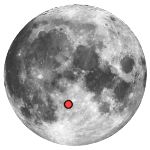Albategnius (crater)
This article needs additional citations for verification. (January 2023) |

 Lunar Orbiter 4 image | |
| Coordinates | 11°12′S 4°06′E / 11.2°S 4.1°E |
|---|---|
| Diameter | 129 km |
| Depth | 4.4 km |
| Colongitude | 356° at sunrise |
| Eponym | Al-Batani |
Albategnius is an ancient lunar impact crater located in the central highlands. It is named after the Mesopotamian Muslim astronomer and scientist Abū ʿAbd Allāh Muḥammad ibn Jābir ibn Sinān al-Raqqī al-Ḥarrānī aṣ-Ṣābiʾ al-Battānī, Latinized as Albategnius.[1]
Albategnius is one of the largest craters of Nectarian age.[2]
Description
[edit]The level interior of Albategnius forms a walled plain, surrounded by the high, terraced rim. The outer wall is somewhat hexagon-shaped, and has been heavily eroded with impacts, valleys, and landslips. It attains a height above 4,000 metres along the northeast face. The rim is broken in the southwest by the smaller crater Klein.[citation needed]
Offset to the west of the crater's midpoint is its central peak, designated Alpha (α) Albategnius. It is longest in extent in the north–south direction, extending for just under 20 kilometres, and has a width about half that. The peak rises to an altitude of roughly 1.5 km, and a tiny, relatively fresh crater is at the top.[citation needed]
Location
[edit]Albategnius is located to the south of the crater Hipparchus and to the east of both Ptolemaeus and Alphonsus. The surface in this area is marked by a set of nearly parallel scars that form channels running roughly in a north–south line, bent slightly to the southeast.[citation needed]
Observations
[edit]Albategnius is believed to have been featured prominently in an early sketch drawing by Galileo in his book Sidereus Nuncius (1610), appearing along the lunar terminator.[citation needed]
Names
[edit]Albategnius is named after Mesopotamian Arab astronomer Al-Battani. Like many of the craters on the Moon's near side, it was given its name by Giovanni Riccioli, whose 1651 nomenclature system has become standardized.[3] Earlier lunar cartographers had given the feature different names. Michael van Langren's 1645 map calls it "Ferdinandi III Imp. Rom." after Ferdinand III, the Holy Roman Emperor.[4] Johannes Hevelius called it "Didymus Mons".[5]
Satellite craters
[edit]


By convention these features are identified on lunar maps by placing the letter on the side of the crater midpoint that is closest to Albategnius.[citation needed]
| Albategnius | Latitude | Longitude | Diameter |
|---|---|---|---|
| A | 8.9° S | 3.2° E | 7 km |
| B | 10.0° S | 4.0° E | 20 km |
| C | 10.3° S | 3.7° E | 6 km |
| D | 11.3° S | 7.1° E | 9 km |
| E | 12.9° S | 6.4° E | 14 km |
| G | 9.4° S | 1.9° E | 15 km |
| H | 9.7° S | 5.2° E | 11 km |
| J | 11.1° S | 6.2° E | 7 km |
| K | 9.9° S | 2.0° E | 10 km |
| L | 12.1° S | 6.3° E | 8 km |
| M | 8.9° S | 4.2° E | 9 km |
| N | 9.8° S | 4.5° E | 9 km |
| O | 13.2° S | 4.2° E | 5 km |
| P | 12.9° S | 4.5° E | 5 km |
| S | 13.3° S | 6.1° E | 6 km |
| T | 12.6° S | 6.1° E | 9 km |
See also
[edit]References
[edit]- ^ "Albategnius". Gazetteer of Planetary Nomenclature. USGS Astrogeology Research Program.
- ^ The geologic history of the Moon. USGS Professional Paper 1348. By Don E. Wilhelms, John F. McCauley, and Newell J. Trask. U.S. Government Printing Office, Washington: 1987. Table 9-4.
- ^ Ewen A. Whitaker, Mapping and Naming the Moon (Cambridge University Press, 1999), p.61.
- ^ Ewen A. Whitaker, Mapping and Naming the Moon (Cambridge University Press, 1999), p. 198.
- ^ Ewen A. Whitaker, Mapping and Naming the Moon (Cambridge University Press, 1999), p. 204.
Bibliography
[edit]- Andersson, L. E.; Whitaker, E. A. (1982). NASA Catalogue of Lunar Nomenclature. NASA RP-1097.
- Bussey, B.; Spudis, P. (2004). The Clementine Atlas of the Moon. New York: Cambridge University Press. ISBN 978-0-521-81528-4.
- Cocks, Elijah E.; Cocks, Josiah C. (1995). Who's Who on the Moon: A Biographical Dictionary of Lunar Nomenclature. Tudor Publishers. ISBN 978-0-936389-27-1.
- McDowell, Jonathan (July 15, 2007). "Lunar Nomenclature". Jonathan's Space Report. Retrieved 2007-10-24.
- Menzel, D. H.; Minnaert, M.; Levin, B.; Dollfus, A.; Bell, B. (1971). "Report on Lunar Nomenclature by the Working Group of Commission 17 of the IAU". Space Science Reviews. 12 (2): 136–186. Bibcode:1971SSRv...12..136M. doi:10.1007/BF00171763. S2CID 122125855.
- Moore, Patrick (2001). On the Moon. Sterling Publishing Co. ISBN 978-0-304-35469-6.
- Price, Fred W. (1988). The Moon Observer's Handbook. Cambridge University Press. ISBN 978-0-521-33500-3.
- Rükl, Antonín (1990). Atlas of the Moon. Kalmbach Books. ISBN 978-0-913135-17-4.
- Webb, Rev. T. W. (1962). Celestial Objects for Common Telescopes (6th revised ed.). Dover. ISBN 978-0-486-20917-3.
- Whitaker, Ewen A. (1999). Mapping and Naming the Moon. Cambridge University Press. ISBN 978-0-521-62248-6.
- Wlasuk, Peter T. (2000). Observing the Moon. Springer. ISBN 978-1-85233-193-1.
External links
[edit]- LTO-77C1 Albategnius — L&PI topographic map
- Albategnius at The Moon Wiki Archived 2018-05-30 at the Wayback Machine
- Wood, Chuck (April 8, 2005). "Cups and Saucers". Lunar Photo of the Day. Archived from the original on May 30, 2018. Retrieved September 10, 2017.
- Wood, Chuck (May 27, 2007). "Drawings". Lunar Photo of the Day. Archived from the original on June 14, 2011.
- McCabe, Frank (April 24, 2009). "Double Crossed". Lunar Photo of the Day. Archived from the original on September 22, 2019. Retrieved September 10, 2017.



